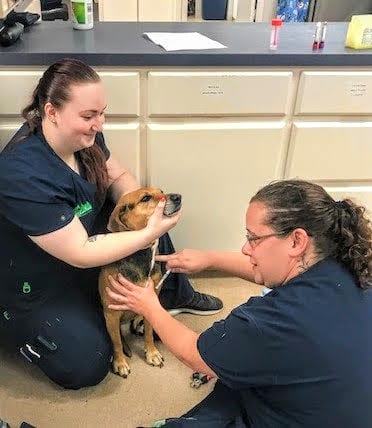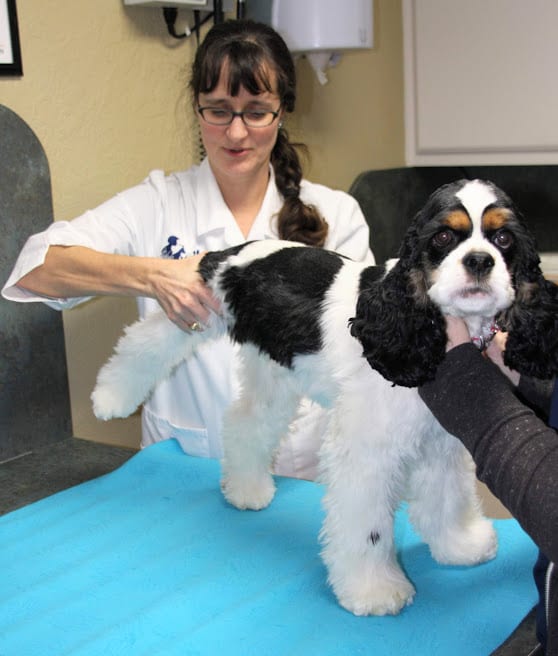Tell me about: The Importance of an Annual Pet Wellness Exam

If you’ve received a postcard in the mail with a cute photo of a puppy or kitten on the front and on the flipside a reminder that Fluffy and Mittens are due for vaccinations along with their annual exams- please don’t toss it! Read on to find out why.
Why an Annual Pet Wellness Exam?
Have you ever asked yourself if a pet exam is even necessary? Dognaturally.com published the following results from a Bayer study: 95% of veterinarians polled strongly suggested that both dogs and cats need at least one wellness exam annually.
If you google ‘annual pet exam’ even Dr. Google lists several links that advocate an annual exam because they save lives. Additionally it is nice to know that your pet has a doctor that knows both your pet and you.
Think back on your last annual exam and what took place while you were there- a pleasant greeting, a discussion on how you are feeling- and if something is “off” you’re asked to tell the doctor more about it. At this point very little is happening to you physically other than a quick peek and listen to various places on your body. There is one very important difference in pet and human health care: you can talk and your pet cannot. If your ears hurt you communicate with your doctor that you are having painful earaches; Fluffy cannot. A thorough exam is needed to determine your pet’s health and it absolutely helps to have a working relationship established with your pet’s veterinarian.
A Thorough Pet Wellness Exam Walk-Through
- Expect a little paperwork followed by a technician will show you to an exam room.
- In the exam room, you’ll be asked for a complete history which usually consists of questions such as, “Is Fluffy on any medications?”, “What food is Fluffy eating? How often and how much food does Fluffy eat each day?”, “Do you feed Fluffy table scraps?” It’s super important that you answer the questions for your pet honestly- food intake, exercise, and all health-related questions are setting up a full picture of your pet’s home life. It is important to have a complete and accurate history. Andy Roarke, a rock star in the Veterinarian world, explained, “Understanding what is “normal” for a pet is of great importance when veterinarians are faced with potentially abnormal findings. When I treat patients who have not been to a veterinarian for extended periods of time, I find myself wondering things like “Is this pet losing weight? If so, how much?” and “Are these blood chemistry levels increasing?” The unfortunate truth is that if no one has investigated or recorded these values previously, I don’t have any basis for comparison. That makes finding meaningful health trends more difficult. Having routine examinations helps establish a normal baseline for each pet, making it much more obvious when something happens that is abnormal.
- Next, your technician will take your pet with her or him to the treatment area of the clinic where other trained professionals might do things such as trim nails, take vitals, and collect samples which are used for various test(s) such as a heartworm test or a fecal test. It is never a bad time to start with some baseline bloodwork (more on bloodwork in the upcoming months). Feel free to ask your technician and or doctor what bloodwork tests are offered and what the value is to your pet. When everything is finished in the treatment area your tech will return your pet and will then get the doctor.

Note from Author: Every veterinarian has their own way of performing a complete physical exam but all of the below are part of a thorough physical exam.
- Your veterinarian will palpate the whole body. It looks like the doctor is simply just loving on your pet (which they are) but the doctor is also examining your pet’s lymph nodes, belly, skin and coat for any abnormalities such as organ enlargement, growths, or tumors.
- An oral exam is performed. The term dental diseasein dogs and cats is very broadly used to describe gingivitis (inflammation of the gums) and tartar build-up (that yucky yellow/brown build-up of the teeth). An additional term commonly used to collectively describe these two conditions is periodontal disease. Tarter and gingivitis are graded on a scale of 0-4, zero being no tarter/gingivitis up to level 4 where teeth are encapsulated with tarter and possibly bleeding gums (in the pet world, February is known as dental month. Country Friends Veterinary Clinic promotes dental month to promote awareness. I’m looking forward to sharing more information on this in an upcoming Tell-Me-More blog post).
- Your veterinarian will listen to your pet’s heart and lungs. The doctor is listening for heart murmurs, abnormal rhythms, and crackling and wheezing in the lungs. If heart and lung problems are detected early the progression of the disease can likely be slowed. A pet can have a heart murmur and not act sick until the heart disease significantly worsens.
- Your pet’s eyes and ears will be examined for signs of infections or problems.
- It may appear that your veterinarian has lost his/her mind as he/she begins doing yoga with your pet (they aren’t, really). This part of the exam is actually a range of motion test. This is particularly important with our geriatric patients. When your technician is taking a history make sure to note any over the counter supplements that you are giving your pet to keep their joints nice and mobile. Stay tuned in September for more information on senior pets.

- If your pet is intact (not neutered or spayed) the doctor may perform some palpations involving the reproduction organs and depending on where that pet is at in his or her life your veterinarian may discuss alteration surgeries (spaying and neutering). In April and November, we offer a promotion for educating our community on the importance of spays and neuters. Please visit our blog to learn more: https://cfvc.net/tell-me-about-spaying-and-neutering/
- Keeping track of your pet’s weight is an important part of an annual wellness examination. Animals are graded on a scale of 1-9.0 for a body condition score with a 1 being severely malnourished and 9.0 being morbidly obese; 4.5 is the norm. At some point in the exam, your pet will be weighed to determine if recommendations are needed. It’s a good idea to take these recommendations seriously! Soon we will have a blog talking about obesity in animals make sure to check it out. If you are having trouble controlling your pet’s weight the issue of simply over-eating may not be the reason. Make sure to voice any concerns to your doctor. Just like humans, there are many medical issues that can cause weight problems and there are many diets and medications that can help control weight and appetite. Hills offers a healthy weight protocol program which your doctor can talk to you about. This would also be a great time to talk to your doctor about any gastrointestinal issues (vomiting, diarrhea, change in appetite), it may be time to switch diets or try out a probiotic.
- Your pet’s attitude and mental status will be noted in the record as well; this is good for both young and senior pets alike- a doctor may comment on any aggressive, anxious, or fearful behaviors as this can be helpful in keeping all staff members safe and help us know what makes your pet more comfortable (treats, peanut butter, going slow with the exam, etc.). These notes are referenced by our staff before entering the exam room with your pet.
- Once the wellness exam is complete, and it has been determined that your pet is truly healthy, the doctor and technician will administer vaccines and any other treatments (such as cleaning ears, clipping fur, or expressing anal glands) if needed.
- At the conclusion of your pet’s exam, the doctor will type up all notes of his or her findings which become the beginning of your pet’s medical record. Should you ever move away you can take these notes with you to your next veterinarian who will appreciate these medical notes very much. While the doctor is typing up your notes your technician will go over any prescribed medications and he/she can answer any questions you may have thought of.
- Finally, approximately 2-3 business days after leaving the clinic a technician will call or email you the results of heartworm and or fecal test. If something is positive a doctor or tech will be in touch ASAP to discuss additional treatment. More than likely you’ll need to order heartworm prevention at the very least. Check out our online pharmacy for a variety of preventions (and almost all other medications you may need) at great prices (there is something for every price range and every need) https://countryfriends.covetruspharmacy.com/

Pet Health Coverage for Wellness Exams
If you are concerned about the cost of an annual wellness examination consider insurance. Insurance is a small monthly premium with wonderful benefits! Most pet health coverage plans include an annual wellness exam that is covered 100%, similar to health policies for people. It’s a great idea to look into coverage to help with the unforeseen costs of sickness. (For more information click here: https://cfvc.net/tell-me-about-pet-insurance/ ). Country Friends Veterinary Clinic promotes prevention for many reasons but these two are the most important: 1. Your pet has a better chance of a healthy and long life. 2. Prevention is always less expensive than treatment!
We’re so glad that you trust Country Friends Veterinarian Clinic with your pet’s health. We know they are more than pets and we fully understand that your pets are family (because we all have fur families too!) Your pet’s health affects their overall wellbeing, therefore, you will not be sorry making this investment into your pets life.
References:
https://www.dogsnaturallymagazine.com/yearly-pet-exams-are-they-necessary/

